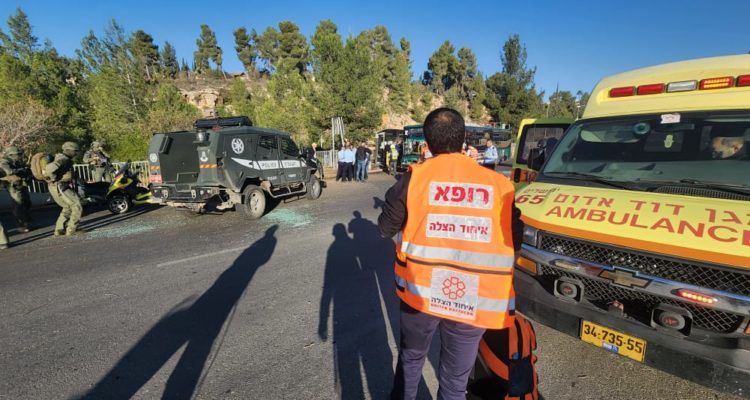Since the start of 2022, the Shin Bet has foiled 34 bombing plots and 330 planned shootings.
By Yaakov Lappin, JNS
Wednesday’s double terror bombing in Jerusalem sent shock waves throughout the State of Israel because it was a different style of attack than the one Israelis have, sadly, grown accustomed to seeing since March this year, when the latest escalation began.
Unlike the individual or small groups of terrorists who, acting on radical ideology and incitement to violence, picked up a gun, a knife, or embarked on a car-ramming attack, this time a better organized terrorist cell detonated two bombs—apparently by remote control—at bus stops in the capital.
Police and the Shin Bet have exhausted their immediate physical searches, and the hunt for the perpetrators will now move to the intelligence front.
Meanwhile, security personnel will be working around the clock to prevent the next bombing, scanning buses and bus stops in the city and trying to figure out how terrorists were able to make their way to western Jerusalem.
It is too soon to know who or which organization conducted the attack, but it is possible to note that in recent years, the Popular Front for the Liberation of Palestine (PFLP) has taken a lead in remote-control bombing terrorism.
Last week, a car bomb that likely contained explosives detonated by remote control was discovered by the Israel Defense Forces in Samaria, after it caught fire prematurely. In August 2019, a PFLP cell detonated a remote control bomb in Dolev, 17 miles northwest of Jerusalem, killing a 17-year-old Israeli girl and seriously wounding her father and brother. Members of that terror cell were later arrested.
It is important to note that the level of threat to Israeli civilians from Palestinian terrorists is always high, whether there are specific warnings of plots, which can be acted upon by security forces who launch raids into terror hubs such as Jenin and Nablus, or whether there are more general alerts.
According to Maj. Gen. (res.) Alon Levavi, a senior research associate at the Miryam Institute and a former Israel Police deputy commissioner, major police reinforcements will be arriving in the Jerusalem district and at the seam line, and there will be a joint police, Shin Bet and IDF effort to gather as much intelligence about how Wednesday’s twin attacks occurred.
Since the start of this year, the Shin Bet (Israel’s security agency) has foiled no fewer than 34 terrorist bombings as well as 330 planned shootings, 54 stabbings, five car-ramming plots, two suicide bombings and three kidnappings.
Col. (res.). Michael Milshtein, a former adviser on Palestinian affairs to the Israeli Defence Ministry’s Coordinator of Government Activities in the Territories (COGAT) unit and a former head of the Department for Palestinians Affairs in the IDF’s Military Intelligence Directorate, said during a call organized by Media Central that despite the fact that the Second Intifada (2000-2005) saw many more attacks and casualties, “this time we and the Palestinians are much more concerned about the results of this wave of escalation—this is a result of the fact that this wave of escalation reflects deeper developments in the Palestinian arena and in the relations between Israel and the Palestinians.”
Milstein pointed to the “rise of the Z generation in the Palestinian arena, the young generation,” which he noted has been behind “most of the terrorism in the Samaria area, in Nablus and Jenin. Groups of younger Palestinians, most of them born around the year 2000. Most of them have no relations with the PA [Palestinian Authority] or even Fatah. Most feel deep alienation towards the PA,” he said.
With the Palestinian Authority losing its grip in parts of Samaria to armed terror gangs, and the image of the PA at an all-time low among Palestinians, in no small part due to corruption, nepotism and its violation of human rights, Milstein said, the current situation does not look promising.
Israel has a broad set of military measures it can call upon to confront terrorism, but one tool that it has also relied upon for the past 15 years to boost stability—economic easements for Palestinians living in Judea and Samaria, commonly known in the West Bank, seems to be losing its effectiveness.
All this amounts to a continued deterioration of the security situation. Although the resilience of the Israeli people and the great capabilities of the Israeli security forces will continue to provide a resolute response to terrorism, challenging times could lie ahead.





